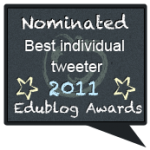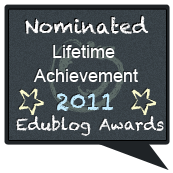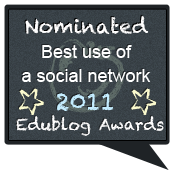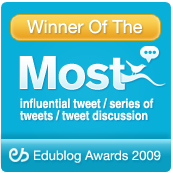Over this last year I have been fortunate to have been sent to many education conferences on behalf of SmartBrief in pursuit of content and guest bloggers for SmartBlog on Education. It is a dream job for a retired educator and an education blogger. The intent is to always keep the educator’s voice on SmartBlog authentic and relevant. In that capacity, I have attended and conducted a multitude of workshops on various education topics. Since I am no longer in the classroom, and have no need to apply what I learn about current teaching methods in a classroom setting, I often attend these workshops as an observer, or even a critical observer in some cases.
In conference after conference, and workshop after workshop I have observed successes and failures in the methods employed by presenters to get their material across to their audiences. Of course my biggest criticism is that too many presenters view the people in the room as audiences, and themselves as some sort of entertainer. Of course a successful presenter is part entertainer, as is any teacher, but more importantly, he or she is there at a conference workshop to educate educators and that is a primary goal. For that goal to be met presenters might be better served thinking of the people in the room as learners, and employ their best skills as an educator. In fairness to most presenters, the best do just that.
Much can be learned as an educator by watching what works with a bunch of teacher/learners. Of course there are some who would argue that these are adult learners and shouldn’t be compared to kids. I used to think that as well, but I am not as sure, after all that I have observed.
I found one of the best explanations of adult learning in this article: “Adult Learning Theory and Principles” from The Clinical Educator’s Resource Kit.
According to the article Malcolm Knowles an American practitioner and theorist of adult education, defined andragogy as “the art and science of helping adults learn”.
Knowles identified the six principles of adult learning as:
- Adults are internally motivated and self-directed
- Adults bring life experiences and knowledge to learning experiences
- Adults are goal oriented
- Adults are relevancy oriented
- Adults are practical
- Adult learners like to be respected
After considering these principles and observing many of them first hand at these professional conferences, I started to wonder if the reason why these same principles do not apply to kids, at least on the secondary level, is because we prohibit them from happening in our education system. Do we limit our students learning by blocking access to the very things that motivate us as adults to learn?
Can Students be self-motivated and self-directed? As adults some might say we are “pursuing our bliss” therefore, we are self-motivated and self-directed. Are our students bereft of bliss, or are we blocking out their bliss?
At the more successful conferences providing adult learning environments I have observed many things that aided the learning of adults. The best conferences provided Internet access for all. This enabled adults to use varied and sundry laptops and mobile devices. I still revel at the memory of a room full of learners listening to Chris Lehmann at the Educon Conference as he placed notes on a white board. When he was finished with his illustrated point in the conversation, 40 adults stood up and took a picture of the whiteboard with their mobile devices (mostly cellphones) for later reference. Student classrooms might have over 40 students in them but how many are allowed to take pictures of the teachers’ notes?
Of course the resounding positive comments from any of these learning environments is that there is a love of the conversation, as opposed to the lecture. That is common at Educon and it is the mainstay of the most successful Edcamps. Of course that conversation method is not the focus of teaching kids. Most educators focus on direct instruction and lecture as the mainstay for their lessons.
Then there is the cry from a multitude of adult conference learners that they hold teacher-presenters in the highest regard, because they are authentic. They have been in the classroom, and have paid their dues, so to speak. When real classroom teachers talk about education, it is relevant and real. This is a common sentiment among adult conference learners. I guess that relevance is important to the adult learner. When it comes to the kid learners are they even given a smattering of relevance or are we steeped in curriculum some of which may have been around since the mid 1900’s?
Of course the biggest outcry from adult learners at conferences comes when they are subjected to PowerPoint presentations that are text-ladened and read to the learners word for word by the presenter. This is the most egregious of mistakes and often the initiator of an exodus by the adult learners from the room. What alternative do kid learners have given the same set of circumstances?
Maybe as adult learners we need to take a look in the mirror before we resume our role as teachers for kids. In the final analysis, I do not think that there are differences in the way we learn as adults, or kids, but rather the differences lie in the opportunities afforded to learn. If we respected kids more as learners, they might be more self-directed and motivated in their learning. If they are allowed to participate in their learning, they might take more ownership. What learner wants to own something that is not in his, or her interest to own? If we can understand better how we learn best, maybe we can alter how we teach to be the best.












Well said!
Agreed, the principles of adult education are really not any less different to the principles of best practise for students. To view student learners as different to adult learners is a mistake we can ill afford to make if we wish to retain our students interest and motivation.
I wrote a similar blog post awhile ago about this. I suspect that pedogogy and andragogy are not two discrete methods but more of a continuum of styles, and andragogy is what we should be striving towards as best practise!
I just finished reading “Tinkering Toward Utopia,” and one of the points the authors make is that self-directed learning reforms from the past did result in students being more independent and having slightly higher achievement. BUT students who were disenfranchised in a more traditional style school were still disenfranchised and lacked motivation in these new schools. Sadly it seems that by the time students reach secondary schools we’ve already killed the love of learning that would make these reforms successful.
[…] Pedagogy vs. Andragog | My Island View: […]
I’m surprised students might not be able to take photos of the board. Mine do and I never thought that might be unusual.
Interesting post.
[…] Over this last year I have been fortunate to have been sent to many education conferences on behalf of SmartBrief in pursuit of content and guest bloggers for SmartBlog on Education. It is a dream … […]
[…] Over this last year I have been fortunate to have been sent to many education conferences on behalf of SmartBrief in pursuit of content and guest bloggers for SmartBlog on Education. It is a dream … […]
I recently went to ICOT13 and tried to take notes about how the presenters captured their audience. Fantastic conference (best i’ve been to in years), but in many cases there was little to write so i gave up, deciding that as they had limited time to get their message across, perhaps identifying pedagogical approaches was not an appropriate thing to tease out. But it was. Those whose messages stuck had relevant messages, wove their own experiences into the sessions and respected their audiences’ knowledge. Others, even very well regarded thinkers, did not connect. The difference is now clear, was I treated as the audience, or as the learner. Thanks for clarifying this Tom. I will use the adult learner principles to challenge the teachers I work with. I’ll also make sure I keep pressure on myself to respect and draw from my audiences and keep the messages relevant to their needs, not to furthering my own.
An additional important piece for teachers is taking their curriculum and helping students understand how it is relevant to them. At a conference, I am already interested in what is being presented so the presenter knows s/he has my attention. With students, you need to establish that connection – and that can be difficult for a teacher. To simply say, “you must know this because it is the information on which you will be assessed” doesn’t work. Great teachers I know and have worked with are able to share with students the importance of learning what they are teaching, and how it influences them. It doesn’t mean that you must make curriculum trite or simplistic, but actually help the learner draw parallels between their learning and growth into adulthood. The best teacher can do this by creating experiences for students to learn through, allowing the students themselves to make (and share with each other!) the connections. If teaching were simply offering a lecture, then teachers would have some real competition from recorded material like that offered through resources like Khan Academy. That is simply a delivery – anyone can offer a delivery of material. Master teachers create the forum through which students interalize what they need to grow – and that skill is priceless!
Nicely stated. Thank you!
I engage my students, Grade 4/5 daily through using the work of Sugta Mitra. My kids are highly engaged. They are responsible for their learning in groups. The best part is that all major behaviour issues have disappeared. Your chart epitomizes what is happening in my work. Thank you for posting it.
From the Wikipedia article on Andragogy (critique section):
‘Knowles himself changed his position on whether andragogy really applied only to adults and came to believe that “pedagogy-andragogy represents a continuum ranging from teacher-directed to student-directed learning and that both approaches are appropriate with children and adults, depending on the situation.” ‘
A seventh principle that can shed some light in the actual (huge) difference of pedagogy vs andragogy is:
“Adult Learners chose to attend school” and consequently chose to for it(in many more ways than just financial-which is also important.)
This is the motivational difference that makes all the difference between the two types of learners.
Anyone who is now an adult learner is always eager to point their in own difference in learning now vs …then. They point out especially the differences in motivation, in maturity, in focus, in determination of now and then. Why don’t we listen to them instead of playing Educational jargon theories with each other. Why do we presume to know them better than they know themselves? For more years than I would want to admit, I have taught adult Learners in various environments, and the first thing they do when introducing themselves is pointing out their learning differences compared to earlier in their lives.
Absolutely on the money…most non adult learners(not all of course) I have known would rather be elsewhere and are pressured by family, social rules , peers etc to follow a path that is not necessarily theirs. This is evidence that the two types of learners should not be treated the same…in fact no learner should be treated “exactly” the same as another to begin with.
A few months ago I wrote an article (in English) “Child learring and adult learning” based on many of the same premises you raise in yours. See http://otra-educacion.blogspot.com/2012/02/child-learning-and-adult-learning.html
Hi Tom – I believe you have some really good points, exacerbated by the fact that these days learners (of any age) come to learning environments with the existing templates of knowledge that were formerly the exclusive domain of adults (before the many resources for exploration of topics that interest people of all ages and the meritocracy, vs. age or “rank” of anyone within those communities.) The teacher is often not the most knowledgable person in the room about a topic – could be anyone of any age. There is one facet of andragogy, however, where I may disagree. It’s transformative learning – which yes, a younger learner can go through, but really it is still more common in the “adult” world. Jack Mezirow outlines steps (which have been built upon by more contemporary theorists) that begin with a disorienting dilemma, trying out of new roles, reintegration – seeing everything differently both retrospectively and in the future. Yes, a younger person could go through those steps but the mere fact that an adult identifies with a role, a career, a self that is “a teacher” “a doctor” ….fixed in their personal identity and construct – often makes that disorienting dilemma quite profound and both the process and outcome well….transformational. I am not denying it can happen to anyone at any age, but the foundation on which an adult stands is often more fixed, stronger and more resistant to change. Nothing is always – but thought I might point that out, as much as I have been thinking many of the same thoughts you articulate (what’s the difference anymore?) I think the difference is in transformative learning. Otherwise? Not so much.
[…] Over this last year I have been fortunate to have been sent to many education conferences on behalf of SmartBrief in pursuit of content and guest bloggers for SmartBlog on Education. It is a dream … […]
[…] Pedagogy vs. Andragogy | My Island View […]
RE: Knowles identified the six principles of adult learning as:
Adults are internally motivated and self-directed
Adults bring life experiences and knowledge to learning experiences
Adults are goal oriented
Adults are relevancy oriented
Adults are practical
Adult learners like to be respected
Will this work with younger learners? Is it true for them? Common sense tells you that some will, some won’t. And that it depends on the person. And you will even find this does not apply to many adult learners… The points are generalizations.
Some kids are internally motivated and self-directed….
It depends on their age, maturity level, and life experiences. Those who are not, are not, because they are not at that stage in their life yet. And some people never become good at self direction.
Some kids bring life experiences and knowledge to learning experiences….
But… most cannot, because they have not had time to have them yet. A lot of that is an “environmental thing”.
Some kids are goal oriented….
Many are not mature enough. Adults tend to have goals because they have needs and experience. They have learned to ask: “Will ‘this’ get me what I want and need?” The “this” could be a course, a book, a video, etc….
Some kids are relevancy oriented…..
But again, most do not have the experience to be able to determine what is relevant to their needs. Else many would rebel at taking chemistry, biology, history, or algebra, as they would say “irrelevant to my needs, plans”. They might likely say that … about learning how to do their own income taxes, too, though. They do not realize they will be paying someone to do them for 20-60 years. Even if they get rich and have accountants, it is still useful to know what is going on. But tell that to your average 16 year old.
Some kids are are practical, too…..
That depends on upbringing, age, maturity and personal experiences. A kid who has no home, and has been on the street, will be very practical.
MOST kid learners like to be respected, too.
But all to often, they get little of it. Sometimes, sadly, they just do not deserve it much.
I have to laugh a little bit. At some point in my academic career, when I wasn’t able to find gainful employment, I flirted with a PhD in Education. I was interested in seeing whether or not adult learners would benefit from blended learning as part of an overall leadership training program. So I held my nose and took courses with books that had titles like “Teachers in the Action” and “Social Action Research Theory” and the like. Man it was like manna from heaven for teachers. Constructivism was described in the books. And people like Dewey were mentioned.
Some of the teachers in my classes held their noses too. Seven years later – they still do. I switched sides. Now I’m the professor – in an adult learning program for future trainers. I’m currently trying to divine the difference between pedagogy and androgogy. Malcom Knowles and Gagne are no help. They give examples and then wax and wane about how adults are “self directed”. The stench of social action research and constructivism reared its ugly head. Somehow if you’re older you have these experiences and if you’re younger you don’t.
One day I was nearing the gate to my condominium. Out pops my three year old friend, a neighbor’s boy. Cute little guy. And could he build sand castles. While in school I used to watch him building. He was masterful as he used the process of elimination to figure out the best ways while I was banging my head against the wall trying to understand how adults learn. One day this little boy – let’s call him Scooter (not his real name). So I’m talking up the sidewalk and he pops out, “Kevin,” he says, “KEVIN he says.” “Hey scooter, how are….” he interrupted me. “Don’t step there Kevin,” why not Scoot? Well there’s an ant hill there and there are red ants.” “Did you find them yourself?” I asked. “Well I did and then the dog found ’em and then my mom came out of the house real fast.” “Really?” I said, quite astounded. “Yes,” little Scooter said, confidently. Now mind you my brain was full of all kinds of stuff. I think I had the grocery list in my head, homework, some fine idea or other…” But little Scooter taught me something. And you know what that is? Kids can have authentic experiences. They can be awfully mature. They can see the world as we don’t. And I agree with Roger Schank, school is awful. And I think if a giant typhoon swallowed up the pedagogues in New York City and California and Ohio and maybe Pennsylvania and Indiana – we’d be none the worse for the wear.
We’ve spent billions trying to educate adults and children – and we do one thing well – we KNOW how to recreate the wheel. The wheel might be square and it might be awfully artful. Heck the wheel might be made of the best material possible. But guess what the wheel can’t do? It can’t turn! Adult learners aren’t that much different than children. We just need to stop listening to a bunch of adults who have a vested interest in keeping the status quo – well “quo”. Scooter taught me more in 10 minutes than I probably learned in several years of graduate school.
[…] Over this last year I have been fortunate to have been sent to many education conferences on behalf of SmartBrief in pursuit of content and guest bloggers for SmartBlog on Education. It is a dream … […]
[…] Over this last year I have been fortunate to have been sent to many education conferences on behalf of SmartBrief in pursuit of content and guest bloggers for SmartBlog on Education. It is a dream … […]
[…] Andragogy. May 3, 2013 by tomwhitby. Over this last year I have been fortunate to have been sent to many education conferences on behalf of SmartBrief in pursuit of content and guest bloggers for SmartBlog on Education. […]
[…] Andragogy. May 3, 2013 by tomwhitby. Over this last year I have been fortunate to have been sent to many education conferences on behalf of SmartBrief in pursuit of content and guest bloggers for SmartBlog on Education. […]
Reblogged this on Sean Donnelly's Site and commented:
Nice piece on the difference between pedagogy and andragogy
Reblogged this on My Working Corner.
[…] The obvious answer may be that children have a motivation to learn that is different from adults. I have addressed this in a previous post, Pedagogy vs. Andragogy. […]
[…] out Instructional Design for more on Knowles and Andragogy and Tom Whitby’s excellent case for adopting the principles of andragogy for everyone, even […]
[…] Whitby, T. (2013, May 03). Pedagogy vs. Andragogy. Retrieved May 25, 2016, from https://tomwhitby.wordpress.com/2013/05/03/pedagogy-vs-andragog/ […]
[…] https://tomwhitby.wordpress.com/2013/05/03/pedagogy-vs-andragog/ […]
Not going to get involved in the Pedagogy vs Androgogy debate. I just want to comment on the attendees who got up and took pictures of the whiteboard: that is really an analogue way of doing things. The resultant output would be an image file that is largely inaccessible as a learning resource. It would most likely be stored in a Photos folder, would have to be moved to a more appropriate folder, it would have a strange filename like IMG20160612_17h32.JPG, it would have no metadata embedded to it, and it would be very difficult to annotate the text on the image. All and all, a poor electronic learning resource. What the presenter should have done is to use an online tool to capture his/her notes (it could be as simple as using a Google Notes tool, or Google Presentations, or Office 365 tool, or even tools like Padlet or Todaysmeet. The presenter should then have shared the document in whichever format with the attendees, even if initially an empty document was shared. Attendees could have contributed to the emerging document, even if the shared document only had “Comments only” rights. When all was done, they could have stored the final output on their own cloud storage space, a document which had multiple contributors. The document would be accessible, metadata could be attached, and it could have a name that was meaningful and easy to find.
[…] Technology’s effect on education is difficult to assess, because it is not just the technology that affects the learning. If there are three teachers teaching the same subjects in a school and are given equal access to technology, how can the technology impact on learning be fairly assessed? If one teacher welcomes the tech and works to use it to its best advantage, while the other two teachers are less comfortable and less willing to fully commit, is the technology that is failing to help students learn? Two thirds of the students would be limited with their technology in this example. Even if there was a massive improvement in the third of the students who succeeded with tech, two thirds would fail to show improvement, yet all had equal access to the tech. Blaming the failure on the tech is much easier than saying teachers are not living up to their professional obligation. Maybe we need to use the technology to address the adult learning of educators before we can expect to fairly assess the effect of technology on student learning. That would be using Andragogy to promote Pedagogy. For a better understanding of Andragogy read this: https://tomwhitby.com/2015/04/13/the-importance-of-andragogy-in-education/ or https://tomwhitby.com/2013/05/03/pedagogy-vs-andragog/ […]